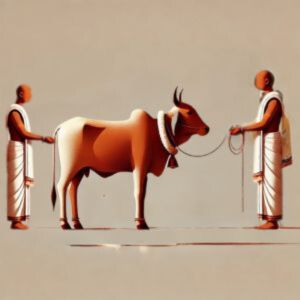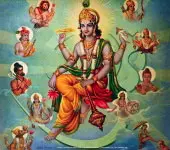Comments
Read more comments
How Rivers Helped in Keeping India as a Single Unit
We were examining whether 'Unity of India' is only a political statement or whether it is a reality. Was it a reality?
We know that at the time of independence in 1947, there were 562 princely states in India, which were integrated into the present entity called India. So, was there any concept of unity before this? Did we even recognize ourselves as a single nation, as a single unit?
We saw that Bharata Varsha was largely protected from invasions, mainly cultural invasions, by the great Himalayan wall in the north. We were blessed with fertile land and the availability of water, which made us a self-sufficient, agriculture-based community. When Europeans had to turn seaward, invade, and plunder other continents for survival, we never had to do this. This self-sufficiency also made us a peace-loving community with higher goals in life.
Water and rivers have played a major role in the development of Bharata as a single unit. It would be improper to say that Bharata developed into an entity over a period of time due to various circumstances. It was always so, right from the time of creation. These are factors that have contributed to keeping this unique identity.
Water, for us, is divine. Water symbolizes unity because, after Pralaya, when every individual identity dissolves and merges into a single unity, it is water everywhere. This state is called Ekarnava, the single ocean that is everywhere.
Through the Vedas and Puranas, this concept is deeply ingrained in the Indian mind and thought process. We worship water; we worship rivers. When other cultures view water only from a utilitarian perspective, for us, water is divine. The rivers are divine.
Since everyone is equal in the eyes of God, even as a resource, we believed that everyone had a right over them. You would hardly find any instance where one princely state tried to block water flowing into its neighbor. Don’t think the technology to build dams was unavailable then. They simply didn’t think this should or could be done. Water is divine—who would dare to block its path?
Bhagiratha brought Gangaji from heaven to earth, and Lord Shiva helped. Who has the right to block her path? She would flow wherever she wished, blessing the lands and people on her way. If there was a shortage of water somewhere, they wouldn’t try to build a dam and usurp it.
All these disputes are recent. All these water-sharing disputes are politically motivated. They arise due to the lack of understanding among politicians about the divine aspect of water and rivers. Such issues were never there before.
All the states along the path of the Ganga, Yamuna, and Godavari equally benefited from their blessings. This was a common thread uniting them. River festivals were celebrated across Bharata Varsha. For example, Ganga Dussehra, celebrated on Jyeshta Shukla Paksha Dashami, marks the avatarana day of Ganga Mata.
Even today, this festival is celebrated across the states on the path of Gangaji—Uttarakhand, Uttar Pradesh, Bihar, Jharkhand, and West Bengal. On this day, everyone on the banks of the Ganga goes to her and worships her. They light lamps and perform aarti.
On the same day, thousands of people perform the same puja across many of the ancient princely states. Isn’t this a major unifying factor? They have a common sentiment towards Gangaji, a shared feeling towards her. Hastinapur, Panchala, Kashi—they all shared this common sentiment. Gangaji was a mother to all of them.
These rituals are not recent, not like a film festival or a tourism promotion campaign. They have existed for ages. You will find their references in all our scriptures.
There is much more to how rivers have helped in keeping India as a single unit. We will continue exploring this further.
Knowledge Bank
What is the meaning of avatara?
A divinity descending from its usual abode, coming to a certain place, at a certain time, assuming a particular body with some purpose is called an avatara. Lord Vishnu descending from Vaikuntha to Vrindavan during Dwapara Yuga assuming the body of Sri Krishna to establish dharma is a typical avatara.
Tips for conception
According to the Ayurvedic text, Charaka Samhita the couple desirous of a child should avoid the first three days from the onset of menstruation. For a male child, they should have intercourse on the even days of the cycle and for a female child, the odd days. Soon after the intercourse, the woman should not lie on her sides or face down. The woman should avoid overeating, staying hungry or thirsty, fear, depression, anger, scorn, excessive passion, or desire for another man.
Quiz
Recommended for you
Godanam - Dos and Don'ts

Do you know that a Shiva hater is in fact a Vishnu hater as well?

Ganesh Chalisa

jaya ganapati sadaguna sadana karivara vadana kri'paala. vighna harana mangala karana jaya jaya girijaalaala. jaya jaya jaya ganapati ganaraajoo. mang....
Click here to know more..